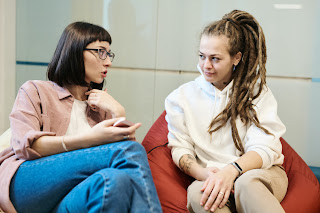Being a teen in this day and age is much different than when your parents were your age. I'm sure you've heard this before. This same sentiment was certainly felt when your grandparents talked to your parents as well about most of the same concerns. If you choose to have children, these same feelings and sentiments will be expressed to them. It's a normal cycle from parent to child.
But for now, let's explore mindfulness today and how it will benefit your current as well as your future wellbeing. Your thoughts and concerns about so many changes and new experiences may all seem overwhelming. So as you read this know that this time, right now is all about you, your relationship with your parents, teachers, friends, the future, and the most important relationship you’ll ever have: with yourself.So many aspects of your life are at a point where they may feel like they just want to burst out. This is normal. Our bodies experience many different sensations that are a result of our brains releasing different hormones into our system. This may, at times even manifest itself in an uncomfortable physical sensation.
Sometimes, depending on the intensity of the sensation our mind may construct some type of story which oftentimes isn't true. We may feel overly sensitive to some from of rejection when there was no intended malice. Before we respond, we need to mindfully examine the situation for what is is and not what we 'think' it is.
So when we experience these uncomfortable sensations it is important to recognize these conditions in the moment so we may bring mindful awareness to them. Remember, being mindful is also being non-judgmental towards having those feelings.
As a teen I'm sure you have many different types of relationships, but how do you walk a wholesome path with your relationships?
How do your peers feel? Your peers have the exact questions as you and are experiencing the same feelings of uncertainty you are, although they may express it differently.
Some common questions you may have are:
- Do my friends like me? Sure, they're your friends!
- What will I do after high school? Does it truly matter? I promise you it doesn't but what does matter is how kind you are. That's what people will remember.
- Are you the class clown? This 'hey, look at me' suggests that one is desiring affirmation or some form of positive reinforcement from a bad behavior. A sarcastic remark perhaps?
- Social media presence. Keep it 'G - Rated'. There was an old saying during World War II that went 'loose lips, sink ships'. You don't want that sinking ship to be yours next week, next year, or five-years from know. Besides, you shouldn't be doing hurtful things anyway, right?
- Parents. Yes, they love you and yes, they're proud of you. Sometimes parents get mad at you because of 'their' expectations for you. It's an extension of their world view that doesn't necessarily align with yours. Be cool about it and simply bring awareness to the fact that they don't want to see you hurt.
-Teachers. This is a hard job, no question about it. Imagine you coming into work each day and seeing probably over 100 different people each with their own unique personality and needs going through life changes. Not to mention teachers are people too that are also dealing with sometimes stressful life events. Be empathetic and compassion towards them. 'After' you graduate recall a few of the good ones and friend them on Facebook (old people don't use Snapchat) and keep in contact with them. Knowing they made a positive difference in a students life is truly why they're in the profession.
- Yourself. You will always have you. The face in the mirror will change as you get older but your essences will always be 'you'. Long after your body has ceased to exist, your conscience will always be there. Do good and engage in kind actions in this life so that you have a better future in this life and the next.
As you begin to experience more situations it’s important to start now to develop the necessary skills to mindfully address not only adversity and disappointment but overwhelming joy and good times as well. Both circumstances can lead to additional suffering if not viewed appropriately.
How can too much joy cause suffering?
When either side of our emotional state is out of balance suffering occurs but when we are too overjoyed for too log we develop an emboldened ego. This leads to feelings of superiority which may lead to risk taking behavior.
You will make mistakes along the way, we all do, including adults, and the mistakes we make aren’t the problem. It’s living in them long after they have occurred. Learning to let go of guilt and shame are liberating and allow you to experience life in a more wholesome way. Learning to let go also holds true to those who may have hurt you.
So how can you, as a teen, begin mindfulness practice?
Meditation is certainly involved in the process but even before you begin this truly search your feelings before you speak or engage in an action. Ask yourself, is it wholesome?
Be certain to help others. Look at service activities at your school (homeless, food pantry, relief funds). Being of service to others develops empathy and compassion and lets go of greed and callousness.
Do your best to try and not wish away your life. Statements like 'I can’t wait until I get my drivers license, or go off to college' take you out of the present moment. Being mindful is about being in the present moment, not the future nor the past.
Apologize first, no matter what the offense. This offers grace and compassion to both of you.
Use kind speech and don’t be sarcastic. The humor wears out quickly and is unappealing even when people laugh.
And last but not least, join our teen sangha - it’s free Wednesdays at 3:30 PM CST. It's important to have a mindful community to help you along.
Wishing you continued peace and wellbeing,
Vladimir
You are warmly invited to follow on us on Facebook and Instagram at @bluelotuscenter for more ways to improve your mindfulness practice and wellbeing.
Blue Lotus Meditation and Mindfulness Center is a registered 501(c)(3) religious organization.
Website and monthly newsletter: www.bluelotusmeditation.us
For guided meditations and Dharma talks, please visit and subscribe to our YouTube channel.



.png)






.png)